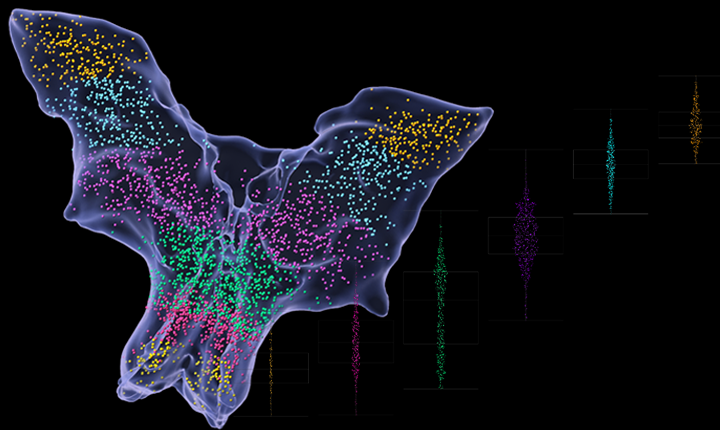As biologists we use classification to better understand the living world around us. Classification allows us to simplify the variations we perceive, from the extensive taxonomy of organisms to the various types of endosomes in cells to the grouping of phenotypes in our experiments. Imaris 9.6 makes the classification of objects detected in your images easier than before with new tools including Machine Learning. Not only is assigning a class to the objects found in your image easier, but also the reporting and presentation of the differences across classes.
Try Imaris 9.6 for FreeThe power of Imaris 9.6 lies in the enhanced simplicity and new capabilities for downstream analysis. Analysing your data within regions of interest, splitting objects into several classes based on their properties or neighbourhood, comparing the classes is the most straight forward thing now. This unique functionality is built on a combination of several features:
Now, imagine all these features are batchable to increase your throughput!
Try Imaris 9.6 for FreeLearn how you can use the various combination of Imaris 9.6 features to classify detected objects into logical groups for further analysis:

Automated classification of Spots and Surfaces components is included in the object creation wizards enabling classification based on selected statistic (1D) or the combination of 2 features (2D) and a trainable Machine Learning Classifier (ML). Classes are labelled and available for visual presentation, in 1D and 2D Vantage plots and for downstream analysis. Classification and labelling of objects is batchable.
In Imaris 9.6 Machine Learning Classifier can be easily trained to classify detected Spots and Surfaces based on user input and taking advantage of all standard statistics calculated by Imaris (including new - Average Distance to Nearest Neighbour) and additional “Machine Learning Statistics”, which provide more information about local intensity landscape, “texture”, intensity on the edges and shape information. Machine Learning Classification classification protocol can be applied to multiple images in a Batch mode.
In Imaris 9.6 the both Vantage 1D View and a new 2D Scatterplot View let you split values by their labels to facilitate a simple visual comparison. With this options you can very easily see the statistical differences between classes of objects
The Imaris Learning Center hosts a wide range of tutorial videos, how-to articles and webinars to guide you through the many features of Imaris. We have provided some links below which will get you started on some of our most recent developments.
 公安机关备案号31010402003473
公安机关备案号31010402003473